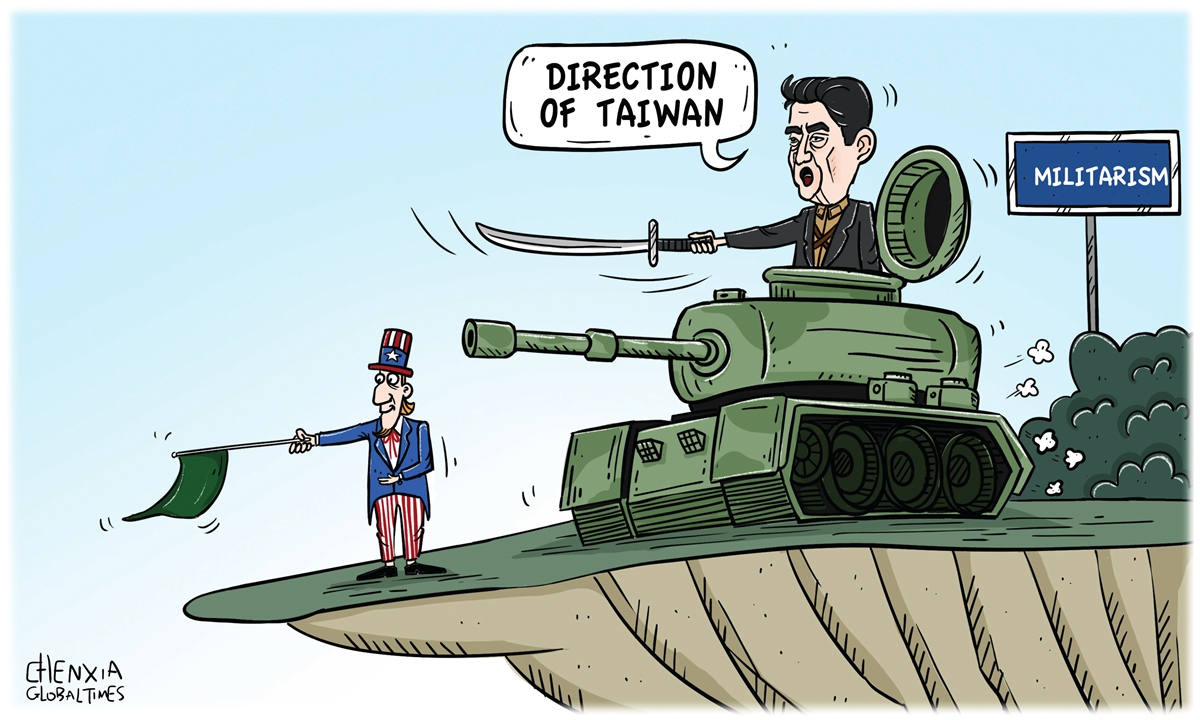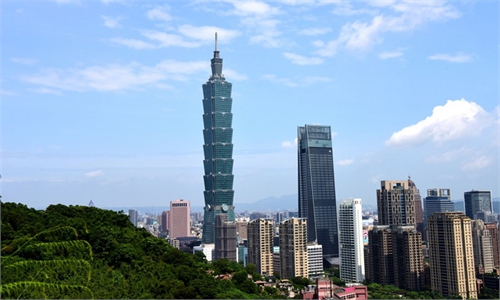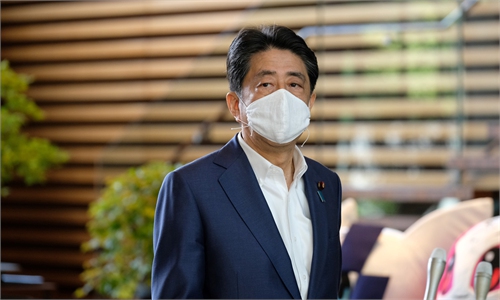China's rare emergency meeting 'a warning to Kishida govt over Abe's influence in extreme right-wing thought and militarism'

Abe's lunacy Illustration: Chen Xia/GT
China's rare "emergency meeting" with the Japanese ambassador over erroneous remarks made by Japan's former prime minister Shinzo Abe on Taiwan question was powerful and necessary at a time when the shadow of Abe that went through the Yoshihide Suga cabinet is now reaching Fumio Kishida's administration, which aims to affect Kishida's policies with Abe's extreme right-wing thought and militarism, Chinese observers said on Thursday.
They believed that Kishida should have known about Abe's speech in advance but acquiesced to it, as the Kishida administration cannot shake off Abe's influence and has to please the US by frequently playing its Taiwan card, but observers warned that whether the cross-Straits situation will affect Japan is entirely up to Japan, which will only burn itself if it dares to intervene.
On Wednesday evening, Assistant Minister of Foreign Affairs Hua Chunying called for an "emergency meeting" with Japan's Ambassador to China Hideo Tarumi, lodging solemn representations over Abe's remarks. Hua said Abe's remarks have "openly challenged" China's sovereignty and "given brazen support to Taiwan independence forces."
Hua urged Japan to deeply reflect on history and draw lessons from it, not to undermine China's sovereignty, send any wrong signal to "Taiwan independence" forces, or underestimate the strong resolve, determination and capabilities of the Chinese people in safeguarding national sovereignty and territorial integrity. Japan should not go further down the wrong path or it will face serious consequences, she said.
In an online speech on Wednesday, Abe said, "A Taiwan crisis would be a Japan crisis and therefore a crisis for the Japan-US alliance."
Chinese analysts said the Chinese Foreign Ministry's representation over a former head of government was rare, and is the first time China has called for an emergency meeting with the Japanese ambassador since Kishida took office.
China has made similar moves with other countries over the Taiwan question.
In October, China lodged stern representations with Australia over inappropriate comments by former Australian Prime Minister Tony Abbott on the Taiwan question and his visit to the island of Taiwan.
China's stern representation was necessary, timely and forceful, as Abe's remarks are a challenge to post-war international order and the foundation of China-Japan relations. Abe and his like are viewing bilateral relations through the lens of militarism, and his thoughts and remarks represent the right-wing forces of Japanese politics, Liu Jiangyong, vice dean of the Institute of Modern International Relations at Tsinghua University, told the Global Times.
Hua's strong remarks not only showed that China will not compromise under Japan's threatening rhetoric, but also showed the world that China's determination to not abandon the use of force in reunification will not change, Zhou Yongsheng, a professor in the Institute of International Relations at China Foreign Affairs University, told the Global Times. He said that it's a warning to Japan that it should not be "a mantis trying to stop a chariot."
The day before Abe made the remarks at a forum held by a Taiwan island think tank, Abe had visited Kishida at the Prime Minister's Office for 20 minutes of talks, according to Japanese media reports.
Kishida must have been aware of what Abe was about to say on the Taiwan question on Wednesday, but let Abe say it anyway, in exchange for continued support from Abe's faction. Furthermore, Kishida could also use Abe's words to please the US, which frequently plays the "Taiwan card," said Lian Degui, director of the Department of Japanese Studies at Shanghai Institutes for International Studies.
Abe cannot legally represent the current Japanese government, but he is one of the most influential politicians in Japan and is the head of the largest faction within the ruling Liberal Democratic Party (LDP), and his influence on the Japanese government cannot be underestimated, analysts said.
They said the shadow of Abe ran through the Yoshihide Suga cabinet and is now extending to Kishida's cabinet.
Xiang Haoyu, a research fellow at the China Institute of International Studies, told the Global Times that Abe's remarks sent wrong signals to Taiwan authorities and sent a dangerous message to the international community that "Japan will interfere in the Taiwan question with force," causing some people on Taiwan island to miscalculate the situation.
Taiwan's DPP authorities apparently heard Abe's voice as they expressed gratitude to him. In response, the State Council Taiwan Affairs Office on Thursday warned the DPP authorities not to miscalculate the situation, and said their provocations to split the country and seek political gains through external forces will fail.
Abe's wrong remarks on China are, in essence, a reflection of the wrong historical view held by Japanese right-wing forces, and some people in Japan are still obsessed with their old colonial dream and regard Taiwan island as their "backyard," but attempting to interfere in the Taiwan question will only seriously burn Japan, analysts said.
Abe never left
Some Japanese right-wing forces claimed that Abe was back when he became the leader of the largest faction within the ruling LDP last month, but to some Chinese observers, Abe never left even after stepping down as prime minister. Some analysts said that due to Abe's deep influence, Japanese politics is now dominated by right-wing thought.
Abe has always tried to realize his political ambition, which was a comprehensive strategy involving military, ideology, economy and politics, analysts said.
In addition to Taiwan, he has also stirred up public opinion on the Diaoyu islands issue to pressure China, attempted to bring Japan back to the path of militarism by revising Japan's constitution, bragged about the Indo-Pacific strategy aiming at containing China and catering to the US, analysts said.
Abe is pushing for more extreme moves for himself and the current Japanese government, and Liu said that Abe's next move was probably to visit Taiwan through colluding with Taiwan's DPP authority.
Abe's dangerous remarks were also related to his strategy of seeking benefits from China-US disputes, analysts said.
He became annoyed when China-US relations showed signs of improvement, especially after the two leaders' video summit in November, and used the remarks to fan flames on the cross-Straits situations to cater to the US, Liu said.
Another of Abe's major goals is to revise Japan's constitution, thus stirring up tensions across the Straits and provoking confrontations to serve his political purpose of pushing for constitutional revisions, Xiang said.
Abe will unite the LDP members to accelerate the constitutional revision process, pushing Japan to a more dangerous situation, analysts said.
They said the Kishida cabinet cannot shake off Abe's influence, adding that although Kishida has put forward different economic policies, his policies in politics and diplomacy are a continuation of Abe's. They warned that under Abe's influence, it will be increasingly difficult for Japan to form its own independent diplomacy, and will instead move closer to the US and become the accomplice for the US' China policy.


